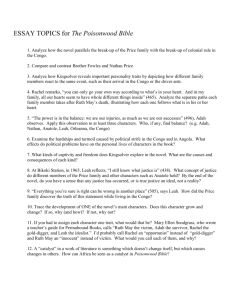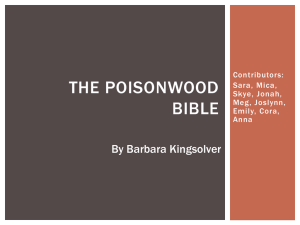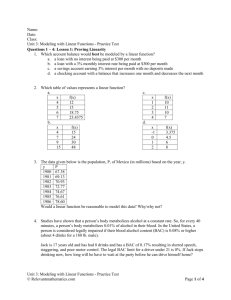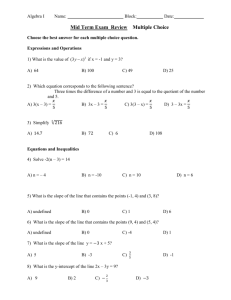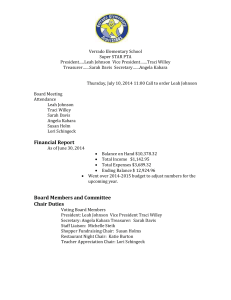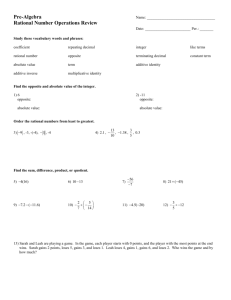essaywellwritten.doc
advertisement
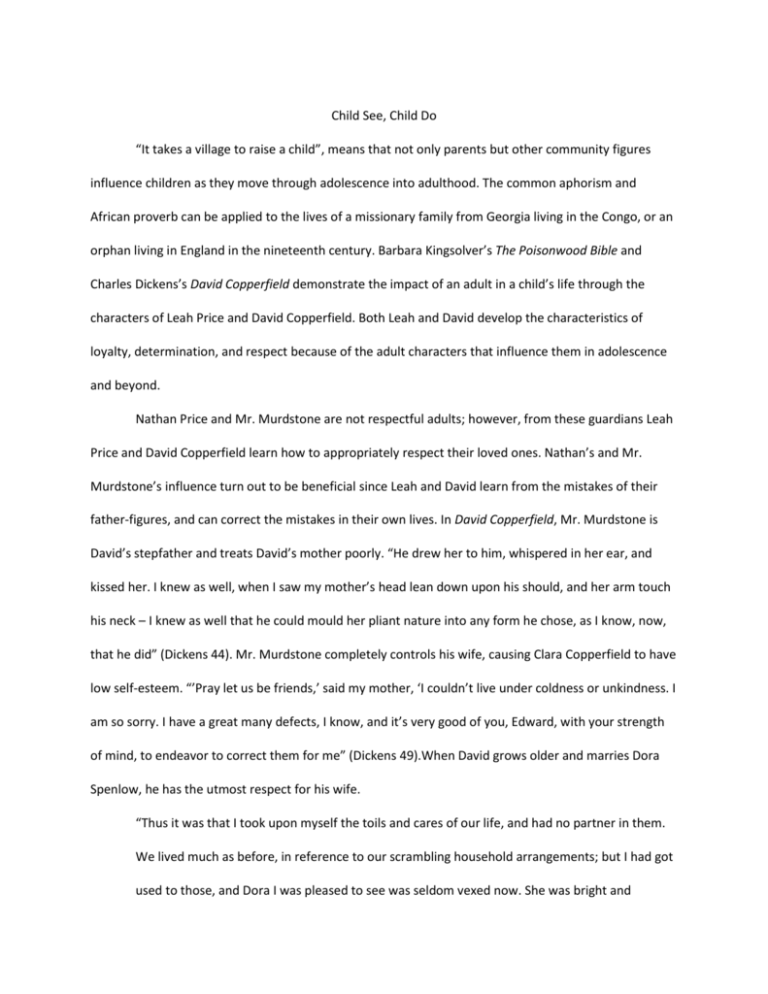
Child See, Child Do “It takes a village to raise a child”, means that not only parents but other community figures influence children as they move through adolescence into adulthood. The common aphorism and African proverb can be applied to the lives of a missionary family from Georgia living in the Congo, or an orphan living in England in the nineteenth century. Barbara Kingsolver’s The Poisonwood Bible and Charles Dickens’s David Copperfield demonstrate the impact of an adult in a child’s life through the characters of Leah Price and David Copperfield. Both Leah and David develop the characteristics of loyalty, determination, and respect because of the adult characters that influence them in adolescence and beyond. Nathan Price and Mr. Murdstone are not respectful adults; however, from these guardians Leah Price and David Copperfield learn how to appropriately respect their loved ones. Nathan’s and Mr. Murdstone’s influence turn out to be beneficial since Leah and David learn from the mistakes of their father-figures, and can correct the mistakes in their own lives. In David Copperfield, Mr. Murdstone is David’s stepfather and treats David’s mother poorly. “He drew her to him, whispered in her ear, and kissed her. I knew as well, when I saw my mother’s head lean down upon his should, and her arm touch his neck – I knew as well that he could mould her pliant nature into any form he chose, as I know, now, that he did” (Dickens 44). Mr. Murdstone completely controls his wife, causing Clara Copperfield to have low self-esteem. “’Pray let us be friends,’ said my mother, ‘I couldn’t live under coldness or unkindness. I am so sorry. I have a great many defects, I know, and it’s very good of you, Edward, with your strength of mind, to endeavor to correct them for me” (Dickens 49).When David grows older and marries Dora Spenlow, he has the utmost respect for his wife. “Thus it was that I took upon myself the toils and cares of our life, and had no partner in them. We lived much as before, in reference to our scrambling household arrangements; but I had got used to those, and Dora I was pleased to see was seldom vexed now. She was bright and 2 cheerful in the old childish way, loved me dearly, and was happy with her old trifles” (Dickens 600). At first, David is worried that Dora is not a traditional wife because she has trouble cleaning, cooking, and performing other household chores. However, when approached about the subject, Dora takes offense. David uses his own childhood to help him remain patient with his wife, and not mistreat her like his own mother was. In The Poisonwood Bible, Nathan Price does not respect his daughters, especially when Leah decides she wants to hunt with a bow and arrow with the men of the tribe. Nathan disregards his daughter’s interest, “It’s nonsense for you to hunt with the men. You’re only causing trouble, and I forbid it.” (Kingsolver 339). Leah respects her husband, even when others do not, because she has experienced the feelings of disrespect from her father. Of Americans’ reactions to Anatole, Leah describes, “Drawing nearer they would always stare at Anatole as contempt gave way to bold shock. His warrior’s face with its expertly carved lines speaks its elegance in a language as foreign to them as Lingala. That book was closed.” (Kingsolver 469). Leah portrays her husband as “an exquisitely beautiful and accomplished man in his own country, to those who appreciate intellect and honor.” (Kingsolver 469). Leah is empathetic to the disrespect her husband receives and therefore honors him highly. Nathan shows no respect to the traditions of the Congolese people. He is ignorant and close minded about their beliefs. When Nathan Price first arrives in the Congo, he wants to plant Kentucky Wonder Beans in a garden so that he can later teach the African people to grow their own beans. However, the Prices’ servant, Mama Tataba, tells Nathan he is planting the crop incorrectly. “Mama Tataba seemed not to be listening. She pointed again at the red dirt. “’You got to be make hills’” (Kingsolver 40). Nathan is resolute in planting the beans with his method. “’Mama Tataba,’ he said at last, ‘I’ve been tending the soil ever since I could walk behind my father.’” (Kingsolver 40). Leah helps her father plant the garden, and even though they later learn that Mama Tataba’s method is best. Nathan’s lack of respect for the Congolese people leads Leah to be more accepting of the Congolese, especially her husband Anatole. 3 David learns from the disrespect his mother received and Leah learns from the poor treatment of her father. Both characters are strongly influenced by negative behaviors; they learn morals of respect and are able to make up for their own fathers’ poor behavior. Characters in Barbara Kingsolver’s and Charles Dickens’s novels are determined to the point of stubbornness, and pass the trait along to the children they raise. Nathan Price, Betsey Trotwood, and Mr. Pegotty are all determined in their endeavors and so are Leah and David. In The Poisonwood Bible, Nathan Price was so determined to baptize the children in Africa that he was eventually burned to death. “He said he wasn’t going to go away till he’d taken every child in the village down to the river and dunked them under. Which just about scared everybody to death… They surrounded him in an old coffee field and he climbed up one of those rickety watchtowers…they set the tower on fire…They said he waited till he was on fire before he jumped off.” (Kingsolver 486-487). Nathan was so persistent that the threat of death did not stop him from trying to have the African children baptized. Her father’s determination forever affects Leah. When Leah decides to stay in the Congo with her husband, she takes on many challenges: social, political, and economic, and is always ready to face them. “In the last months our government paychecks have dwindled from almost nothing to nothing. We tell our coworkers that a mere lack of fund mustn’t discourage our hopes.” (Kingsolver 433-434). Even when everything spirals out of control, Leah stays strong. “Anatole is in prison. Maybe for the last time. I get out of bed and put on my shoes and force myself to take care of the children. Outside the window the rain pours down on all the drenched, dark goats and bicycles and children, and I stand here appraising the end of the world. Wishing like hell we hadn’t come back from Atlanta. But we had to.” (Kingsolver 466). Leah persists and continues to work for the good of the Congolese, even when there are risks involved for her and her family. Though she could have an easier life in America, Leah is stubborn to stay in the Congo and support her husband in his fight against injustice. Betsey Trotwood is 4 firm in her protection of her lawn from the donkeys who trod upon it. Whenever the donkeys come through, David’s Aunt Betsey would do her best, with the help of the servant Janet, to shoo them away. “To his hour I don’t know whether my aunt had any lawful right of way over that patch of green; but she settled it in her own mind that she had, and it was all the same to her. The one great outrage of her life, demanding to be constantly avenged, was the passage of a donkey over that immaculate spot. In whatever occupation she engaged, however interesting to her the conversation in which she was taking part, a donkey turned the current of her ideas in a moment, and she was upon him straight.” (Dickens 183-184). The source of Betsey’s determination may seem trivial, but David learned from his aunt’s example. Mr. Pegotty also showed David the power of persistence. When his niece, Emily, ran away, he decided to search for her forever. “I’m going to seek my niece through the wureld. I’m a going to find my poor niece in her shame, and bring her back. No one stop me! I tell you I’m a going to seek my niece.” (Dickens 419). Mr. Pegotty’s determination was so strong; he could be stopped by no one to reach his goal. David applied the resoluteness he learned to his courtship of Agnes, and finally won her as his wife after many years of friendship. Before going to express his true feelings to Agnes, David proclaims, “I resolved to set this right beyond all doubt; - if such a barrier were between us, to break it down at one with a determined hand.” (Dickens, 802). David wants to have a strong and happy relationship with Agnes, and with the influence of Mr. Pegotty and Betsey Trotwood, they are married. David and Leah are more determined due to the positive influence from adults. Loyalty is a characteristic passed on to Leah and David through example from Orleanna Price and Pegotty. The characters are loyal and demonstrate how the power of loyalty can sustain a relationship to David and Leah. Though Orleanna’s loyalty to her husband Nathan is questionable, she admits that it existed. “I married a man who could never love me, probably. It would have trespassed on his devotion to all mankind. I remained his wife because it was the one thing I was able to do each day.” 5 (Kingsolver 8). Leah, too, is loyal to her husband Anatole. “I could recollect having promised some God or other, more than once, that if I could only have Anatole back I would never ask for another thing on this earth.” (Kingsolver 499). Anatole means everything to Leah, and she always wants him with her, no matter the situation. In David Copperfield, David’s childhood nurse and friend, Pegotty, is loyal to him into his adulthood. After a long courtship, Pegotty finally marries Barkis, the coach driver, and stays with him until his death. “In a word, they were married, and had gone into church for no other purpose. Pegotty was resolved that it should be quietly done’ and the clerk had given her away, and there had been no witnesses of the ceremony” (Dickens 138). Pegotty is also always faithful to David and his aunt. “Always with her, here come Pegotty, my good old nurse…” (Dickens 818). Pegotty’s loyalty inspires David to never leave his first wife Dora, and always think of her, even when choosing to marry Agnes. After the marriage ceremony, Agnes tells David that the only wish Dora had when she died was “’that only I would occupy this vacant place’” (Dickens 809). With Agnes, David is able to remain faithful to his first wife’s wishes, and marry the girl he once looked at as a sister. “We were married within a fortnight… Clasped in my embrace, I held the source of every worthy aspiration I had ever had; the centre of myself, the circle of my life, my own, my wife, my love whom was founded on a rock!” (Dickens 808). David learned to remain faithful to friends from Pegotty and ends up marrying the girl of his dreams. David and Leah learn to be loyal to their spouses from other married couples. The Poisonwood Bible and David Copperfield are novels written with different plots and settings, by authors with separate styles; however, the novels are still connected because in both, influential characters dramatically affect the traits of main characters. Leah and David are taught the values of determination, loyalty, and respect from key adults in their lives. The influential characters need not be characters that Leah and David are enamored with or look to for support. Every adult encountered by an adolescent has the ability to shape that child’s character and life. Growing up is a tough stage and the 6 adults who are with children through the stage will ultimately be the ones who the child emulates over time. Works Cited Dickens, Charles. David Copperfield (Modern Library Classics). New York: Modern Library, 2000. Print. Kingsolver, Barbara. The Poisonwood Bible: A Novel (P.S.). Reissue ed. New York: Harper Perennial Modern Classics, 2008. Print. 7
